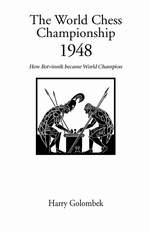World Chess Championship 1948, The
How Botvinnik became World Champion
| Click to enlarge >> |
 |
| By Golombek, Harry |
| ISBN 1843820056 |
| SERIES Hardinge Simpole Chess Classics |
| Paperback 248 pages |
| Subject [Chess
] [Chess - World Championships
] [Botvinnik
] [Smyslov
] [Keres
] [Euwe
] [Reshevsky
] [c 1945 to c 1960
] |
| |
| Published April 2002 |
| UK Price £23.95 |
| US Price $34.95 |
Mikhail Botvinnik, disciple of Josef Stalin and iron man of Soviet chess, seized the chess crown in 1948 in the 'famous five' Match Tournament. This was held to settle the question of the World Championship after reigning champion Alexander Alekhine had died in possession of the title. 1948 ushered in a long period of control of world chess by FIDE, the world chess federation, backed, in turn, by the powerful chess federation of the USSR , the land where chess had become the iconic national game. Botvinnik dominated the field, easily outdistancing his main rivals Smyslov, Reshevsky and Keres , while the hapless Dr. Max Euwe , former world champion , whose sudden and dramatic descent from world class chess was made brutally apparent by this event, was left trailing in last place, 6.5 points adrift of the field. Inspiration and controversy alike still surround the 1948 match tournament . At a time when more than one player claims to be world champion and rival organisations have their own champions, the resolution brought about by the match tournament is often regarded as the holy grail of world title definition. Yet critics also persist in seeing this system as flawed. Why for example was the Polish grandmaster Miguel Najdorf not invited when US Grandmaster Reuben Fine dropped out? Was it because Najdorf had defeated Botvinnik in a recent tournament? Worse, unsubstantiated rumours abound that Paul Keres, an enthusiastic participant in Nazi-controlled competitions of the early 1940s, came under pressure to lose games in Moscow - the very heart of the Soviet Empire - to Stalin's protégé Botvinnik. Harry Golombek, the author of this book, was on the spot throughout and at the very epicentre of all the action. Here he annotates every game and follows every nuance. An International Master and British Champion, Golombek had a fluent knowledge of Russian and was alert to every key variation and possibility. Here are all the games, annotated in detail, of an historic and controversial event. Readers can make up their own minds on the evidence - was Botvinnik the dominating titan of his day or was his triumph founded on the elimination of a dangerous rival and on political favouritism extended by the most powerful man in the Soviet Empire? |
|
|
|

